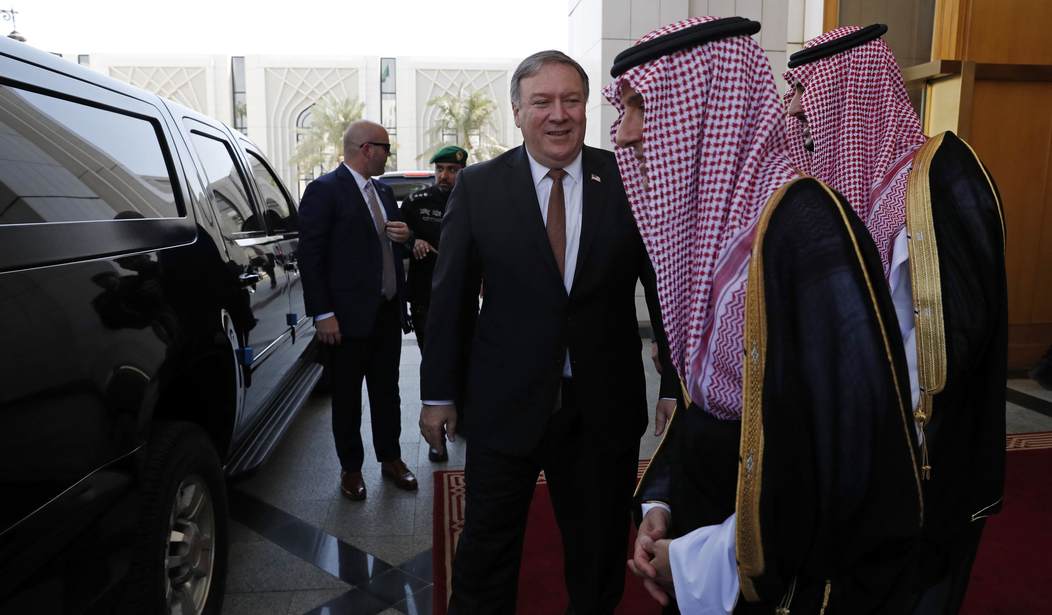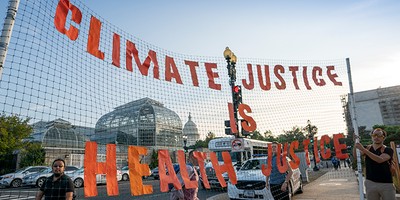Jamal Khashoggi's murder -- and no one now questions whether the Washington Post contributor was killed by Saudi agents in the kingdom's consulate in Turkey -- has far-reaching implications for the Trump administration. President Donald Trump appears to want to help sweep the incident under the rug, providing cover for the Saudis' ludicrous suggestion that the killing was a rogue operation or an interrogation gone awry. And he's enmeshed the highest officials of his administration in the mess by sending Secretary of State Mike Pompeo to Riyadh, where the secretary was photographed, all smiles, sitting with Crown Prince Mohammed bin Salman, who most likely ordered Khashoggi's murder. The administration is giving itself little leeway to take serious measures to protest the killing, signaling to the world that the U.S. cannot be counted on to stand up against bloodthirsty autocrats, even when a U.S. resident and member of the American press is the victim.
I doubt that Trump understands -- or cares about -- what message he's sending. Wealthy Saudis, including members of the extended royal family, have been his patrons for years, buying his distressed properties when he needed money. In the early 1990s, a Saudi prince purchased Trump's flashy yacht so that the then-struggling businessman could come up with cash to stave off personal bankruptcy, and later, the prince bought a share of the Plaza Hotel, one of Trump's many business deals gone bad. Trump also sold an entire floor of his landmark Trump Tower condominium to the Saudi government in 2001. During the campaign, the Trump Organization registered more than a half-dozen limited liability companies in the kingdom, in anticipation of cashing in on Trump's enhanced renown. When Trump actually won (which apparently he didn't think he would at the time), someone must have explained he couldn't move ahead with new business there as president, because he withdrew the registrations. Of course, a little thing like benefiting from the office of the presidency hasn't stopped the Trump Organization, run by the president's two eldest sons, from accepting Saudi largesse since the election. With many Trump properties and brands losing customers in today's highly polarized political atmosphere, Saudis are spending lavishly on Trump properties in Washington, New York and even Chicago as many others avoid them.
Recommended
But if Trump doesn't get why looking the other way when an American journalist is tortured, beheaded and hacked to pieces by a team of Saudi government operatives is bad, surely national security adviser John Bolton and Secretary Pompeo do. Autocrats are stepping up their game around the world. Russian President Vladimir Putin didn't hesitate to order a hit on British soil of an ex-KGB agent and his daughter earlier this year. But the United Kingdom responded quickly, kicking out Russian diplomats and imposing sanctions. The United States followed suit, but only because Congress, not Trump, knew that to do otherwise would have let down an ally and encouraged a despot. When asked in a "60 Minutes" interview Sunday whether he believes that Putin was involved in the poisoning and other assassinations, Trump's response was: "Probably he is, yeah. ... But I rely on them. It's not in our country."
The Trump administration relies on Saudi Arabia, too. It is the enemy of our enemy Iran, which, in political calculus, makes Saudis our "friends." But even friends require reining in at times. And these friends need us more than we need them. We are no longer dependent on oil imports; our oil reserves surpass those of Saudi Arabia. Although Trump worries about losing that promised $110 billion Saudi arms purchase he keeps touting (but which has yet to materialize), the Saudis don't have anywhere else to go if they want to keep their airplanes in the air. They are locked in by past purchases; no one else can deliver the spare parts for U.S.-built weapons. As for the help in challenging Iran, they have no choice there, either. Iran is far more a direct threat to the kingdom than it is to the U.S. And as for their most crucial role -- the war on Islamic terrorism -- the Saudis claim to fight terrorism but are also a major source of funding for radical Islamic schools and mosques that recruit terrorists around the world.
The administration has only a short time to come up with a proper and proportionate response to the murder of Jamal Khashoggi. The president thinks Americans will move on -- but his inaction makes the world a more dangerous place. And next time, the attack just might be on American soil.

























Join the conversation as a VIP Member